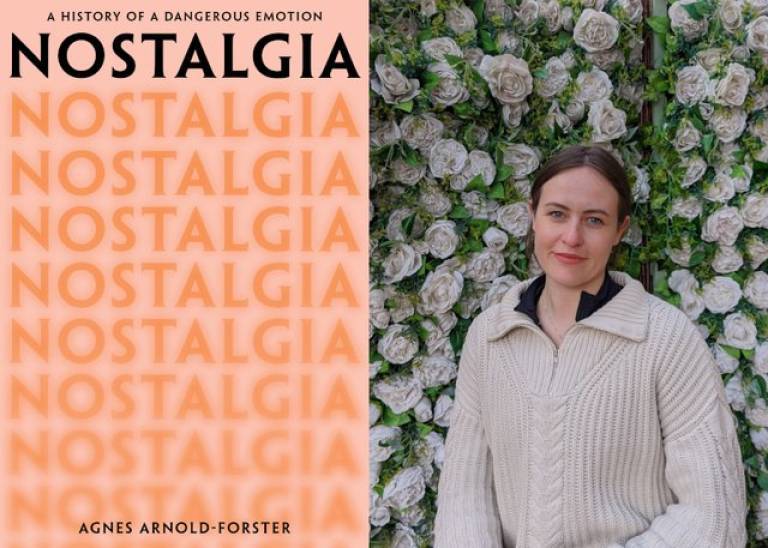Nostalgia: A History of a Dangerous Emotion - In discussion with Agnes Arnold-Foster
23 May 2024
Celebrating the launch of Nostalgia: A History of a Dangerous Emotion on 15 May. A summary of the event can be found below.

Nostalgia is a social and political emotion vulnerable to misuse and reflects the anxieties of the age. It is one of the many ways we communicate a desire for the past, dissatisfaction with the present and our visions for the future.
A collaboration between the UCL European Institute, the Institute of Advanced Studies and UCL Grand Challenges, ‘Nostalgia: A History of a Dangerous Emotion - In discussion with Agnes Arnold-Foster’, on 15 May 2024, sought to examine the history of this complex emotion and used it as a lens through which to consider the changing pace of society, our collective feelings of regret, dislocation and belonging, the conditions of modern and contemporary work, and the politics of fear and anxiety. At the event, Agnes Arnold-Foster, Chancellor’s Fellow at the University of Edinburgh, was in conversation with a panel including:
- Prof. Sonu Shamdasani, Professor in Jung History, UCL SELCs and Co-Director of UCL Health Humanities Centre
- Dr Emily McTernan, Associate Professor in Political Theory, UCL Department of Political Science
- Joanna Elmy, Writer, Journalist and UCL European Institute, Writer in Residency 2024
Agnes Arnold-Foster summarised the main arguments in her book ‘Nostalgia: A History of a Dangerous Emotion.’ She describes nostalgia as an elusive term, whose meaning has changing over time. A hundred years ago, nostalgia was a sickness that afflicted servants in seventeenth-century Switzerland because of pathological homesickness. It attracted the attention of medicine’s finest minds in eighteenth-century England and killed Civil War soldiers in nineteenth-century America. Today, it is no longer a fatal diagnosis. Instead, it has come to signify a longing for the past, often perceived as a weakness in individuals, but also commonly exploited by politicians or by global brands seeking to sell us something. In right-wing political discourse, nostalgia as longing for past glory has often been exploited by leaders promising to ‘take back control,’ or to ‘make America great again.’ However, as Arnold-Foster points out, the phenomenon is by no means limited to the right: Danny Boyle’s portrayal of the NHS in the 2012 Olympic opening ceremony is an example of left-wing political nostalgia. Nostalgia is one way to communicate a desire for the past and a lens through which to see our dissatisfaction about the present. In this way, it can also inform our aspirations for the future. The book examines whether nostalgia can be progressive and creative – as opposed to necessarily a stultifying force. Instead of being isolating politically and personally, can nostalgia draw us together instead of pushing us apart?
In responding, Professor Sonu Shamdasani reflected on configurations of madness, tracing how they evolve over time. An earlier definition of nostalgia describes it as a malady of place. The treatment was often games and useless distractions, and in more severe cases, as Johannes Hofer recorded in 1688, “nostalgia admits no remedy other than a return to the homeland”. However, Immanuel Kant argued that “the place that the nostalgic person yearns for is not so much the actual place, but youth itself, the time before the age of maturity which, though irrevocably past, the nostalgic person associates with the simple pleasures of life,” it was a “disease of imagination.” Reflecting on nostalgia’s journey from disease to emotion, Prof. Shamdasani concluded by referencing post-traumatic stress disorder (PTSD) as the lens through which many of the symptoms previously associated with nostalgia as disease are now understood and asked if PTSD itself is on its way to becoming an emotion?
Dr Emily McTernan asked if the link between the early modern incarnation of nostalgia and what we mean when we talk about nostalgia today is sufficiently strong for a single history of ‘nostalgia’ to be possible. She also considered how technology drives contemporary nostalgia by making available images of the past and pushing them upon us through our smartphones. Finally, Dr McTernan reflected on the dangers of twenty-first-century nostalgia, and questioned whether the rehabilitation of nostalgia Arnold-Foster explores, might risk not sufficiently recognising its power as a corrosive force.
Joanna Elmy pointed to her lived experience in Bulgaria, a country behind the Iron Curtain, for half a century. The community during this time had a deep yearning for their childhood and the West, as they thought the world was better there. When the USSR collapsed, this yearning for an imagined utopia was confronted by the realities, and failings, of the West. Elmy continued by suggesting that it is increasingly difficult to imagine a future in the context of a climate emergency. In this context, we feel a nostalgia for the world as it once was before such large-scale environmental destruction; for a time when some form of future seemed possible.
The session finished with audience questions. The session was chaired by Nicola Miller, Director of UCL’s Institute for Advanced Studies.

Related Links
- Nostalgia: A History of a Dangerous Emotion book
- The Conversation: Nostalgia hasn’t always been a tool for manipulating our emotions – it was once a medical condition
- UCL European Institute
- UCL Institute of Advanced Studies
- Writer in Residency Programme
 Close
Close

